Mold Remediation in Denver, CO
Mold Remediation in Denver is essential for maintaining a healthy living environment. Mold can develop quickly in damp areas, posing serious health risks to you and your family. Whether it's due to a leaky roof, flooding, or high humidity, addressing mold issues promptly is crucial to prevent further damage to your property and ensure the safety of your loved ones.
At Disaster Response, we understand the urgency of mold problems. Our team of experts is equipped with the latest technology and techniques to identify and eliminate mold effectively. We conduct thorough inspections to assess the extent of the mold growth and develop a tailored remediation plan that addresses your specific needs. Our goal is to restore your home to a safe and healthy condition as quickly as possible.
Mold can not only damage your property but also lead to various health issues, including respiratory problems and allergies. That's why our mold remediation services in Denver focus on not just removing the visible mold but also addressing the underlying moisture issues that allow mold to thrive. We take a comprehensive approach to ensure that your home is not only mold-free but also protected against future infestations.
Choosing Disaster Response means you're opting for professionalism and expertise in mold remediation. Our dedicated team is committed to providing exceptional service, ensuring that your home is safe and comfortable. Don't let mold compromise your health and property—contact us today for a thorough assessment and effective remediation solutions tailored to your needs.

- Disaster Response: The Authority on Denver Mold Remediation
- Disaster Response: The Leading Authority on Mold Remediation in Denver
- Mold Testing and Remediation Overview: Following IICRC S520 Standards
- Do You Really Need a Mold Remediation Expert in Denver?
- Reach Out to a Mold Remediation Specialist in Denver, CO, for These Mold-Related Issues
- Essential Steps to Take After Discovering Mold in Your Home in Denver
Disaster Response, The Authority on Denver Mold Remediation
Finding a reliable mold remediation service in Denver, CO, can be overwhelming, but with Disaster Response, the choice becomes clear. With years of experience in the industry, we specialize in effectively eliminating mold and restoring your home or business to a safe environment. Our dedicated team understands the health risks associated with mold exposure and is committed to providing thorough and efficient remediation services.
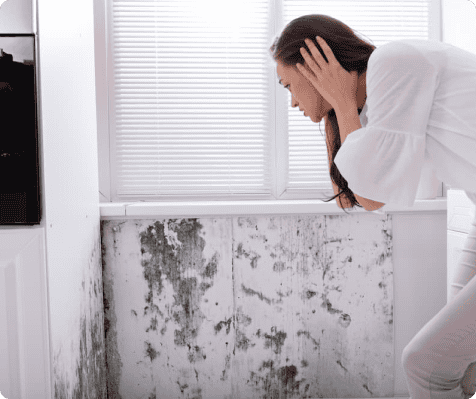
At Disaster Response, we utilize advanced techniques and state-of-the-art equipment to identify and remove mold from your property. Our experts conduct comprehensive inspections to assess the extent of the mold problem, ensuring that no hidden spores are left behind. We prioritize your safety and well-being, employing environmentally friendly products that are safe for both your family and the planet.
Our commitment to excellence extends beyond just mold removal. We also focus on preventing future mold growth by addressing the underlying causes, such as moisture issues and inadequate ventilation. Our team provides valuable advice on maintaining a mold-free environment, empowering you to take proactive steps in safeguarding your property.
Like the iconic landmarks in Denver, CO, we stand as a beacon of hope for those facing mold challenges. Our expertise and dedication to customer satisfaction set us apart in the mold remediation industry.
As true specialists in Denver mold remediation, we focus exclusively on the following services
- Comprehensive Mold Inspections
- Mold Removal and Cleanup
- Air Quality Testing
- Moisture Control Solutions
- Preventative Treatments
- Structural Drying and Dehumidification
- Post-Remediation Verification
- Emergency Response Services
- Residential and Commercial Services
- Consultation and Education on Mold Prevention
At Disaster Response, we strive to be THE authority on mold remediation in Denver. We understand the urgency of addressing mold issues and are here to provide swift, effective solutions. When you choose our services, you can trust that we will restore your space to a safe and healthy condition, allowing you to breathe easy once again.
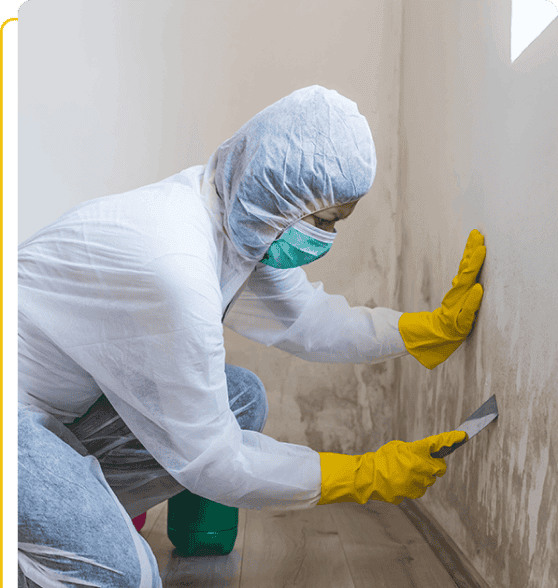
Disaster Response: The Leading Authority on Mold Remediation in Denver
Finding a reliable mold remediation service in Denver can be overwhelming, but with Disaster Response, the choice is clear. With years of experience in the industry, we specialize in effectively identifying and eliminating mold issues, ensuring a safe and healthy environment for our clients. Our dedicated team understands the complexities of mold growth and is committed to providing top-notch service tailored to your specific needs.

At Disaster Response, we utilize advanced techniques and state-of-the-art equipment to assess and remediate mold infestations. Our experts are trained to handle various types of mold, from common household varieties to more hazardous species, ensuring that your property is thoroughly treated. We prioritize safety and efficiency, working diligently to restore your space to its original condition while minimizing disruption to your daily life.
Our comprehensive approach includes not only the removal of mold but also addressing the underlying causes of moisture that contribute to its growth. We believe in educating our clients about mold prevention and maintenance, empowering them to take proactive steps in safeguarding their homes or businesses. With our commitment to excellence, you can trust that your mold remediation project is in capable hands.
As a leading provider of mold remediation services in Denver, we pride ourselves on our customer-centric approach. We understand that dealing with mold can be stressful, which is why we strive to make the process as seamless as possible. Our team is here to guide you every step of the way, ensuring that you feel supported and informed throughout the entire remediation process.
- Comprehensive Mold Inspections
- Mold Removal and Cleanup
- Air Quality Testing
- Moisture Control Solutions
- Preventative Treatments
- Structural Drying and Dehumidification
- Post-Remediation Verification
- Emergency Response Services
- Residential and Commercial Services
- Consultation and Education on Mold Prevention
At Disaster Response, we are dedicated to being the leading authority on mold remediation in Denver. Our expertise and commitment to customer satisfaction set us apart in the industry. When you choose us, you can rest assured that we will restore your property to a safe and healthy state, allowing you to breathe easy once again.
Mold Testing and Remediation Overview: Following IICRC S520 Standards
The IICRC S520 standard provides a clear guide for safely managing mold issues in homes and buildings. Its main goals are to protect people, ensure thorough cleanup, and prevent future mold problems.
1. Assessment and Inspection
Initial Assessment:
- Trained professionals will conduct a detailed inspection of the affected area. This includes visual checks and using tools like moisture meters and infrared cameras to find hidden mold or moisture.
- Understanding moisture sources is crucial, as mold often arises from water issues or high humidity.
Mold Sampling:
- Although not always needed, testing (both air and surface samples) can help identify the type and amount of mold present.
- Sampling is useful when mold is suspected but not visible, such as when there are odors or health concerns.
- If sampling is done, it must follow proper protocols, with analysis performed by accredited labs.
2. Containment Protocols
Containment Procedures:
- To stop mold spores from spreading during cleanup, barriers (like plastic sheeting and negative air pressure) are used.
- The extent of containment varies; small areas might require basic barriers, while larger or heavily contaminated spaces need more extensive containment.
- Workers must enter and exit through decontamination chambers to avoid spreading mold.
3. Personal Protective Equipment (PPE)
- Workers should wear appropriate PPE, including gloves, N95 masks, full-body suits, and eye protection.
- The type of PPE needed depends on how severe the contamination is; more protective gear may be required for heavily affected areas.
4. Remediation Process
Source Control:
- Addressing the root cause of moisture is essential. This may involve fixing leaks, improving ventilation, or managing humidity.
Cleaning and Removal of Mold:
- Mold cannot just be treated with chemicals; it must be physically removed.
- Non-porous materials (like metals and glass) can often be cleaned with HEPA vacuums or damp cloths.
- Severely affected porous materials (like drywall and carpets) should be removed and disposed of according to local regulations.
- HEPA air filtration systems should be used to capture airborne mold spores during cleanup.
Cleaning Techniques:
- Common methods include HEPA vacuuming and scrubbing surfaces where mold is present.
- Antimicrobial agents may be used, but the focus is on physical removal.
5. Post-Remediation Evaluation
Final Inspection:
- After cleanup, a visual inspection ensures no visible mold remains.
- Air and surface tests may be conducted to confirm that mold levels are back to normal.
- It's crucial to check that the environment is dry to prevent mold from returning.
Documentation and Reporting:
- Detailed records of the remediation process, including testing results and cleanup procedures, should be maintained.
- This documentation is important for compliance and may be needed for insurance or legal matters.
6. Ongoing Prevention
- Educating building occupants about moisture control is vital. This includes maintaining HVAC systems, managing humidity, and promptly addressing leaks.
By adhering to the IICRC S520 standard, mold remediation professionals take a systematic and health-focused approach, ensuring that indoor spaces are restored to safe, mold-free conditions.
Do You Really Need, Need a Mold Remediation Expert in Denver?
While it may be tempting to tackle mold issues on your own, hiring a professional mold remediation service can ensure a thorough and effective solution. Mold can pose serious health risks and structural damage to your home, making it crucial to address the problem with expertise. Disaster Response specializes in mold remediation, providing the knowledge and tools necessary to restore your environment safely and efficiently.
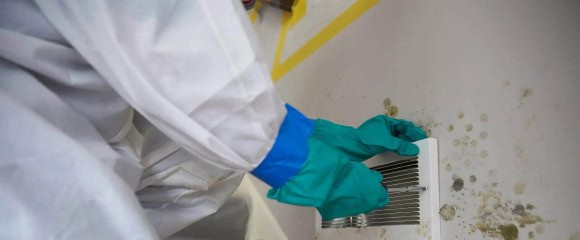
Understanding the Mold Remediation Process
Mold remediation involves a systematic approach to identify, contain, and eliminate mold growth. Professionals like those at Disaster Response utilize advanced techniques and equipment to assess the extent of the mold infestation. This process includes air quality testing, surface sampling, and moisture control measures to prevent future growth. By understanding the specific conditions that led to mold development, experts can implement effective solutions tailored to your situation.
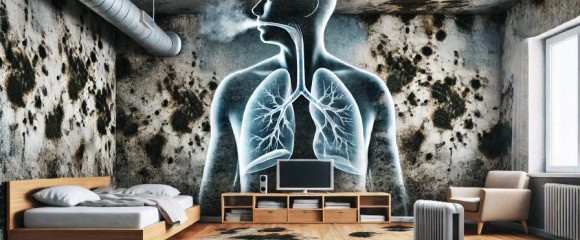
Health Risks Associated with Mold Exposure
Mold can lead to a variety of health issues, particularly for individuals with respiratory conditions, allergies, or weakened immune systems. Symptoms may include coughing, sneezing, skin irritation, and even more severe reactions in sensitive individuals. Engaging a mold remediation expert ensures that the mold is not only removed but that the air quality in your home is restored to a safe level, protecting the health of your family.
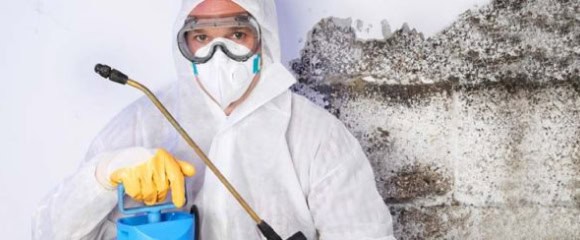
Preventing Future Mold Growth
After remediation, it's essential to take proactive steps to prevent mold from returning. Disaster Response provides guidance on moisture control, ventilation improvements, and regular inspections to maintain a mold-free environment. By addressing the underlying causes of mold growth, such as leaks or high humidity, you can significantly reduce the risk of future infestations.
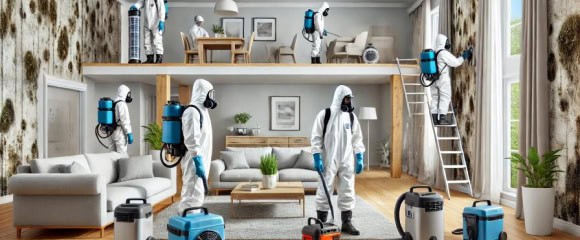
The Importance of Professional Equipment and Techniques
Attempting to remove mold without the proper equipment can lead to incomplete removal and potential health hazards. Professionals use specialized tools such as HEPA vacuums, air scrubbers, and moisture meters to ensure thorough remediation. Disaster Response's trained technicians are equipped to handle even the most challenging mold situations, ensuring that your home is restored to a safe and healthy state.
Reach Out to a Mold Remediation Specialist in Denver, CO, for These Mold-Related Issues
Mold growth can occur in various environments, particularly in areas with high humidity or water damage. This fungal growth can lead to significant health risks, property damage, and unpleasant odors. Recent studies have shown an increase in mold-related issues in Denver, with many homeowners facing challenges in managing and eliminating mold effectively. If you find yourself dealing with any of the following mold situations, it's crucial to contact a mold remediation expert promptly:
Visible Mold Growth
If you notice mold on walls, ceilings, or other surfaces, it's a clear sign that professional intervention is needed. Mold can spread quickly and may indicate underlying moisture problems.
Musty Odors
A persistent musty smell in your home can be a strong indicator of hidden mold. This odor often suggests that mold is present, even if it's not immediately visible.
Water Damage
Following a leak, flood, or any water intrusion, the risk of mold growth increases significantly. It's essential to address any water damage promptly to prevent mold from taking hold.
Health Symptoms
If you or your family members are experiencing unexplained respiratory issues, allergies, or skin irritations, mold exposure could be the culprit. Seeking professional help can ensure a safe living environment.
Condensation Issues
Excessive condensation on windows, walls, or pipes can create a breeding ground for mold. Addressing these issues with a mold remediation service can help prevent future growth.
Previous Mold Problems
If you've dealt with mold in the past, it's vital to monitor the area for any signs of recurrence. A professional can assess the situation and implement preventive measures.
Regardless of the mold issue you're facing, it's important to understand that Denver residents should act quickly to mitigate the risks associated with mold exposure. Mold can not only damage your property but also pose serious health risks to you and your family. Engaging a qualified mold remediation specialist like Disaster Response can provide the expertise needed to effectively eliminate mold and restore your home to a safe condition.
Essential Steps to Take After Discovering Mold in Your Home in Denver
Finding mold in your home can be alarming and overwhelming. Mold can grow quickly and pose health risks, so it's crucial to act promptly. Here are the steps you should follow if you discover mold in your Denver residence:
- Identify the source of moisture that is causing the mold growth.
- Ensure the affected area is well-ventilated to minimize exposure.
- Avoid touching or disturbing the mold, as this can release spores into the air.
- Document the extent of the mold growth with photographs for your records.
- Contact a professional mold remediation service to assess the situation.
- Follow any safety recommendations provided by the remediation experts.
- Keep children and pets away from the affected area until it has been treated.
- Review your home's ventilation and humidity levels to prevent future mold growth.
If you find mold in your home, it's essential to address it quickly to protect your health and property. Mold can lead to various health issues, including respiratory problems and allergic reactions. At Disaster Response, we specialize in mold remediation and are dedicated to restoring your home to a safe and healthy environment.
Contact Your Local Mold Remediation Experts in Denver, CO, for a Free Consultation
At Disaster Response, we understand the stress and uncertainty that comes with mold issues. Our team is committed to providing you with the highest level of service and support during this challenging time. We approach every situation with professionalism, care, and urgency.
Our mold remediation specialists will work diligently to identify the source of the mold, safely remove it, and implement measures to prevent its return. When your home's safety and your family's well-being are at stake, don't settle for anything less than the best—choose Disaster Response today.
Contact Your Emergency
Disaster Response Now!
Latest News in Denver, CO
Denver voters rejecting fur ban and slaughterhouse ban initiatives
Aldo Svaldihttps://www.denverpost.com/2024/11/05/denver-initiated-ordinance-308-309-election-results/
Denver voters gave a strong thumbs-down Tuesday night to ballot measures that would ban businesses from making or selling fur-based products and outlaw slaughterhouses within city limits.In results updated at 11:30 p.m., ...
Denver voters gave a strong thumbs-down Tuesday night to ballot measures that would ban businesses from making or selling fur-based products and outlaw slaughterhouses within city limits.
In results updated at 11:30 p.m., nearly 58% of voters opposed the animal fur ban and 64.6% opposed the slaughterhouse ban, with very little change in the split for and against throughout the evening.
Opponents of the slaughterhouse ban declared victory Tuesday night and Pro-Animal Future, which put the two questions on the ballot and then found itself heavily outspent by opposition groups, issued a statement appearing to concede on both measures at about 9:35 p.m.
ELECTION RESULTS: Live Colorado election results for the 2024 election
Both measures had attracted national attention. Initiated Ordinance 308 asks voters to pass a fur ban that would block businesses from making or selling a range of animal-based products in the city.
Its sister measure, Initiated Ordinance 309, sought to prevent slaughterhouses from starting or operating in Denver city limits. Opponents argued it unfairly targeted the one slaughterhouse facility left in Denver, owned by Superior Farms. It is based in Globeville and employs 160 mostly Latino workers.
“Activists from New Orleans and California used dark money from out of state to try and shut down this local company, but they lost to Colorado workers, farmers, ranchers, and restaurateurs,” said Ian Silverii, the campaign spokesperson for “Stop the Ban. Protect Jobs,” a No on 309 group, in a statement. “We have one message for those who tried to come to our city and our state to run their experiment to upend the lives of so many hardworking people: it was a baaaaaaaad idea.”
Pro-Animal Future highlighted the numerous votes their measures received despite opponents outspending them by a six-to-one margin.
“This was a bold campaign, and no one said changing the status quo was going to be easy,” said Pro-Animal Future spokesperson Olivia Hammond in a statement. “Over a hundred thousand meat eaters voted for a world without slaughterhouses, and that’s a foundation we’ll continue building on. Voters aren’t used to seeing animal rights on the ballot, and we are paving the way with this campaign.”
Although other cities have passed fur bans, Ordinance 308 would go further, defining fur as “any animal skin or part thereof of hair, fleece or fur fibers attached thereto, either in its raw or processed state; or such hair fleece or fur fibers detached from any animal skin and re-attached to another material.”
It would prohibit the manufacture, distribution, display, sale or trade of certain animal products within Denver city limits, with limited exceptions, such as for Native American cultural uses or for cow leather. That could block the sales of cowboy and other hats made of beaver, rabbit or hare hides, as well as fly-fishing lures that include animal fibers.
Supporters argued the ban was merited, given the track record of mistreatment and abuse of animals. They argued most products could be made with synthetic alternatives. They also alleged that fur farms were inhumane and bad for the environment.
Opponents like the National Western Stock Show argued the measure would hurt business owners who engaged in a long-established part of Colorado culture and history. A group called “Hands Off My Hat Denver” also raised money to defeat the measure.
Stay up-to-date with Colorado Politics by signing up for our weekly newsletter, The Spot.
Opponents of Denver fur ban declare victory
Kyle Harrishttps://denverite.com/2024/11/05/denver-ballot-measure-308-results-2024-elections/
Kevin J. Beaty/DenveriteUpdated at 10:13 p.m. on Tuesday, Nov. 5, 2024Fur will stay in Denver.An effort to ban the sale of fur in Denver was failing as votes were counted on Election Day, and opponents of the measure declared victory after 8 p.m. and proponents of the ban conceded just after 9:30 p.m.As of 9 p.m., only about 42 percent of Denver voters were in support of Initiated Ordinance 308, which would strictly limit the sale of real fur products."Thank you to ...
Kevin J. Beaty/Denverite
Updated at 10:13 p.m. on Tuesday, Nov. 5, 2024
Fur will stay in Denver.
An effort to ban the sale of fur in Denver was failing as votes were counted on Election Day, and opponents of the measure declared victory after 8 p.m. and proponents of the ban conceded just after 9:30 p.m.
As of 9 p.m., only about 42 percent of Denver voters were in support of Initiated Ordinance 308, which would strictly limit the sale of real fur products.
"Thank you to the Denver voters tonight for seeing through the mirage that was trying to be presented to them as they attack our way of life here in Colorado," said Paul Andrews, president and CEO of the National Western Stock Show.
It was one of two measures that asked Denver voters to protect animal rights by putting new limits on businesses. Another measure, Initiated Ordinance 309, would ban the city’s only slaughterhouse. The slaughterhouse ban was losing by an even larger margin in the early results.
Roughly half of the city's votes may have been counted at this point.
Together, the measures asked voters to weigh moral arguments about animal welfare against concerns about Denver’s “cow town” traditions and the local economy.
Ballot Measure 308 would have outlawed most uses of fur, from mink coats to cowboy hats made of beavers. New furs could not be sold, distributed or traded in the city’s borders. Animals could not be slaughtered for fur. And fur could also not be sold or traded online.
First-time voter McKenna Rivas, 21, said she’s not keen on killing anything. But she had concerns about the people who make their living purchasing and selling fur — and in particular she worried about how it would affect indigenous people.
“I felt a little torn on that one,” she said.
Ultimately, she opposed the ban.
If it passed, the measure would have banned fur sales generally in Denver. It would have made a few exceptions for used fur products sold at stores whose main purpose is not to trade in fur.
The measure would have also protected Native American cultural, spiritual and tribal uses of fur. Still, sales of fur at cultural gatherings would have not be allowed.
Stores including Overland Sheepskin, A. Tsagas Furs and Leathers, Jonval Leathers and Dan Sharp Luxury Outerwear would have been affected by the ban.
And while fur is taboo in parts of the fashion world, cowboy hat manufacturers were concerned this measure would upend their tradition.
The measure would not have banned leather or wool.
Pro-Animal Future and other animal rights advocates widely back the measure. They have raised just more than $300,000 to campaign for the fur ban and slaughterhouse ban.
“This measure is an important step towards ending the cruel, unnecessary, and outdated practice of killing animals solely to wear their fur,” proponents argued in the city’s voter guide. “On fur factory farms, wild animals like foxes, mink, and rabbits spend their entire lives in tiny wire cages barely larger than their bodies. To preserve the ‘product,’ they are either bludgeoned to death, painfully gassed, or anally electrocuted.”
Opponents, united under the campaign Hands Off My Hat, include the National Western Stock Show, Visit Denver and the Colorado Trappers and Predator Hunters Association. They had raised more than $730,000 for the effort as of Nov. 4.
They argue the measure would be bad for local businesses who sell fur and for Native American vendors who sell products at cultural gatherings.
“Events like the Denver March Powwow are not just gatherings; they are vital expressions of our heritage and identity,” wrote Ernest House, Jr., a Ute tribal member and the former executive director of the Colorado Commission of Indian Affairs, in a statement. “Limiting our ability to share and sell our traditional crafts and goods would be a significant loss for both our communities and the broader public that values and supports them."
The National Western Stock Show is an annual event at the heart of old Denver culture. Hats sold at the event are made from pelts that would be prohibited. The rules would prevent many vendors from being able to sell their goods at the event.
“The Denver Fur Ban would mean that felt hats and other fur goods could no longer be sold at the Stock Show,” the opposition campaign argued. “Cowboys and cowgirls young and old adorn cowboy hats, a truly Western symbol, for this annual event.”
While proponents of the ban have conceded defeat on this measure, they view the overall campaign as part of a multi-year attack on animal agriculture.
"Traditional animal advocacy asks people to make individual changes," says Natalie Fulton, Pro-Animal Future spokesperson. "We've shown that we can think bigger – we can challenge these industries at a systemic level. We've built a movement that will continue growing stronger."
While fur may still be legally sold in Denver, the fight at the polls over the industry's future will continue in this city and nationwide.
This is a developing story and may be updated.
Kyle’s been obsessing over Denver since he moved here from Chicago in 2005: What is this place? Who thrives here? Who’s pushed out? Who has room to create and fulfill their dreams? Whose dreams are squashed? And why? He’s the former culture editor at Westword, where he covered the city’s arts and music scene. Before that, he covered city and state politics as the managing editor at the Colorado Independent. He’s raced triathlons (slowly), grown food (well...with others), and toured the country in a folk-punk trio (apologetically). Now, he's reporting about Denver's growth and couldn't be happier about it.
Colorado 2024 election results: Who won, who lost and races still too close to call
Beth Rankinhttps://www.denverpost.com/2024/11/05/colorado-2024-election-results/
Click here to see a comprehensive list of Colorado election results and check out Denver election results here. While some races are still too close to call, here’s a look at how Colorado candidates and ballot measures performed in this year’s general election. (This is a developing s...
Click here to see a comprehensive list of Colorado election results and check out Denver election results here.
While some races are still too close to call, here’s a look at how Colorado candidates and ballot measures performed in this year’s general election. (This is a developing story and will be updated.)
U.S. Representative District 4: Lauren Boebert vs. Trisha Calvarese
U.S. Representative District 8: Yadira Caraveo vs. Gabe Evans
U.S. Representative District 3: Adam Frisch vs. Jeff Hurd
Proposition 127: Mountain lion and bobcat hunting ban
Amendment 79: Abortion access
Proposition KK: Firearms, ammunition excise tax
Amendment J: Repeal defunct same-sex marriage ban
Amendment 80: School choice
Proposition 131: Ranked-choice voting
Issue 2Q: Denver Health sales tax and Ballot Issue 2R: Affordable housing tax
RTD Ballot Issue 7A: Keep tax money
Initiated Ordinance 308: Fur ban and Initiated Ordinance 309: Slaughterhouse ban
Denver voters rejecting fur ban and slaughterhouse ban initiatives
Ballot Issue 4A: Denver Public Schools bond
Voters back $1 billion bond measures for Denver, Aurora and Cherry Creek schools
Referred Question 2U: Right to unionize for city employees and Referred Question 2V: Binding arbitration for contract disputes in firefighters’ union
Denver voters approve unionization of city employees, arbitration for firefighters
Aurora Ballot Question 3A: Pit bull ban
District attorney
Denver’s 7A: Voters say RTD can keep taxes, remove TABOR cap
Michael Boothhttps://coloradosun.com/2024/11/05/question-7a-results-rtd-colorado/
Metro Denver-area voters agreed overwhelmingly in early vote counts Tuesday to let the Regional Transportation District keep all of its sales tax revenue in coming years, even when the agency takes in money above caps set in the Taxpayer’s Bill of Rights.RTD Question 7A was poised to pass with 69% of the vote from eight metro counties, as of 8:50 p.m. Tuesday.“It’s still early but I’m excited to see the support so far for 7A,” said Danny Katz, CoPIRG executive director, said around 8:30 p.m. &ldquo...
Metro Denver-area voters agreed overwhelmingly in early vote counts Tuesday to let the Regional Transportation District keep all of its sales tax revenue in coming years, even when the agency takes in money above caps set in the Taxpayer’s Bill of Rights.
RTD Question 7A was poised to pass with 69% of the vote from eight metro counties, as of 8:50 p.m. Tuesday.
“It’s still early but I’m excited to see the support so far for 7A,” said Danny Katz, CoPIRG executive director, said around 8:30 p.m. “Transit cuts pollution and is a safer and cheaper way to travel without a car. We started the year with the legislature and Governor investing historic funding in transit and we’re ending the year with voters across our region appearing to say yes to keep RTD’s transit moving forward.”
RTD’s past authority to keep excess TABOR money is expiring, and 7A allows RTD to keep it again for coming years. The current RTD sales tax rate would not change.
The so-called “de-Brucing,” named after TABOR author Douglas Bruce, is a common ballot request from local taxing agencies.
In RTD’s case, a “yes” vote on 7A allows RTD to keep projected revenue of about $50 million to $60 million a year above the expected TABOR cap instead of refunding that amount to millions of taxpayers.
Local elected officials and pro-transit nonprofit groups aligned behind 7A, with no real organized opposition. Some individuals, including at least one former RTD board member, did raise pointed questions about RTD’s recent performance and wondered whether rejecting the de-Brucing would signal to current leadership that riders demand improvements.
RTD, one of the largest transit agencies in the West, gets only about 5% of its budget from riders paying fares. By far the great majority of RTD money, $932 million or 75%, comes from the 1% RTD sales tax consumers pay in the eight-county district.
If sales tax revenue rises above the cap placed each year on local government revenue by the TABOR, RTD would have to return $50 million to $60 million a year to individual consumers. (The cap is determined by annual increases in population and inflation.)
Current RTD Board Member Lynn Guissinger gave big-picture and practical reasons why the transit agency deserved to keep any money over the cap. RTD has made good progress recently, she said, in hiring to bolster its driving and train controller corps to begin restoring routes and frequency cut back in past years.
The agency is also embarking on the highly anticipated East Colfax Avenue “Bus Rapid Transit” rebuild, which creates dedicated fast lanes for transit and increases bus frequency to every few minutes, Guissinger noted. Construction will begin this year. The Colorado Department of Transportation is also working with RTD to study similar formats on busy Colorado and Federal boulevards.
Taking away a significant chunk of RTD revenue would have hurt agency efforts at a time when local officials, air pollution activists and nonprofits are all demanding more transit options, not fewer, Guissinger said.
Voters have previously approved long extensions of RTD’s TABOR exemptions, she said.
And on the practical side, returning $60 million a year would have been a nightmare, she noted. The RTD sales tax is paid by tourists, business travelers, children buying candy or other nonessentials, as well as millions of metro-area residents. Tiny checks or ride vouchers or some kind of compensation would have had to go out to 2 million or more locations, Guissinger said.
A group called Keep Colorado Moving organized the endorsements and support for a “yes” on 7A. CoPIRG, a consumer-oriented nonprofit working on transit, air pollution and recycling issues, made a strong endorsement, and in it mentions others in the coalition including AARP, the Colorado Cross-Disability Coalition, the NAACP, Downtown Denver Partnership, Servicios de la Raza and Denver Streets Partnership.
Former RTD board member and current Jefferson County Commission candidate Natalie Menten was one of the few who spoke out against RTD keeping the tax money.
“My time on the board was pulling my hair, often actually, in frustration with what was a transportation model created back in the early 2000s, and that transportation model has changed so much since then that that model really does not work very well anymore,” Menten said.
COVID and affordable housing demands shifted potential riders away from the expensive hub-and-spoke light rail system focused on downtown Denver that RTD created starting in the 1990s. Regional bus and rail fares became so expensive, though lowered recently, that riders found other means of commuting.
RTD’s ridership has dropped dramatically, falling to 65 million boardings in the past year from 103 million in 2015.
Now the agency is locked into systems that are very difficult to reform, she said.
Ride-sharing services like Uber and Lyft can provide individual rides cheaper than RTD’s most heavily subsidized, infrequent fixed routes in areas like the Jefferson County foothills that Menten served, she said. (Though advocates note those services are not always accessible to RTD riders most in need.)
Meanwhile, RTD’s route and frequency cutbacks have made the service impossible to ride for regular workers frustrated by having to wait an hour between buses, or make multiple connections to get home.
Getting a TABOR refund back would have helped residents find “a transportation mode that fits them best, and that’s what TABOR’s about — not overcharging taxpayers, and letting them make the best choices,” Menten said. In leaving the money with RTD, Menten said, “I don’t see good return on the dollar for the taxpayers.”
Type of Story: News
Based on facts, either observed and verified directly by the reporter, or reported and verified from knowledgeable sources.
Michael BoothEnvironment Reporter
Michael Booth is The Sun’s environment writer, and co-author of The Sun’s weekly climate and health newsletter The Temperature. He and John Ingold host the weekly SunUp podcast on The Temperature topics every Thursday. He is co-author... More by Michael Booth
2024 election results: Denver ballot issues
KUSA.comhttps://www.9news.com/article/news/politics/elections/election-results-denver-ballot-issues/73-7007766a-b4a8-400a-9166-3c0ff7947bdb
Here are the results for three closely-watched ballot issues in Denver.DENVER — Denver voters had several local issues on their ballots this election, including a sales tax increase for Denver Health, a sales tax increase for affordable housing, and a slaughterhouse ban. Here are the results of those three closely-watched contests.> Election results for all of Denver's ballot measures are available ...
Here are the results for three closely-watched ballot issues in Denver.
DENVER — Denver voters had several local issues on their ballots this election, including a sales tax increase for Denver Health, a sales tax increase for affordable housing, and a slaughterhouse ban. Here are the results of those three closely-watched contests.
> Election results for all of Denver's ballot measures are available here.
Denver's voters were asked to approve a sales tax increase this November to keep Denver Health afloat. The hospital is struggling with the cost of uncompensated care. The City Council agreed in June to put the tax increase on the ballot.
The latest results are below:
If approved by voters, the 0.34% sales tax increase would bump Denver's sales tax over 9%. Denver Health estimates it would bring in up to $70 million annually.
As a safety net hospital, Denver Health doesn't turn away patients, even if they cannot pay. In 2023, the hospital reported it lost $136 million treating uninsured patients. They estimate about 10% of that cost went to migrant care.
Denver Health said if the tax measure fails, and the hospital can't get more state or federal funding, the hospital would consider cutting services.
The measure asks Denver voters to hike the city’s sales tax by 0.5% to generate $100 million that Mayor Mike Johnston said will be used to fund affordable housing projects.
The latest results are below:
Johnston unveiled the proposal in July. The measure had a rough time getting through City Council, with some council members expressing concern about the fast timeline to get it on the ballot. Ultimately, the City Council voted 9-4 to send the proposal to the ballot.
The ordinance would ban the construction, maintenance or use of slaughterhouses in Denver. The group Pro-Animal Future is behind the measure.
The latest results are below:
A "YES" vote would shut down the city's only slaughterhouse, the employee-owned Superior Farms lamb processing facility near the Western Stock Show Complex. The ban would put the facility's employees out of work by early 2026, although the ballot initiative specifically calls for them to be prioritized in new workforce training programs.
Opponents, like the Colorado Livestock Association, say the closure would have a devastating impact on local ranchers and the domestic food supply.
For all of the latest election results, head to www.9news.com/elections.
Disclaimer:

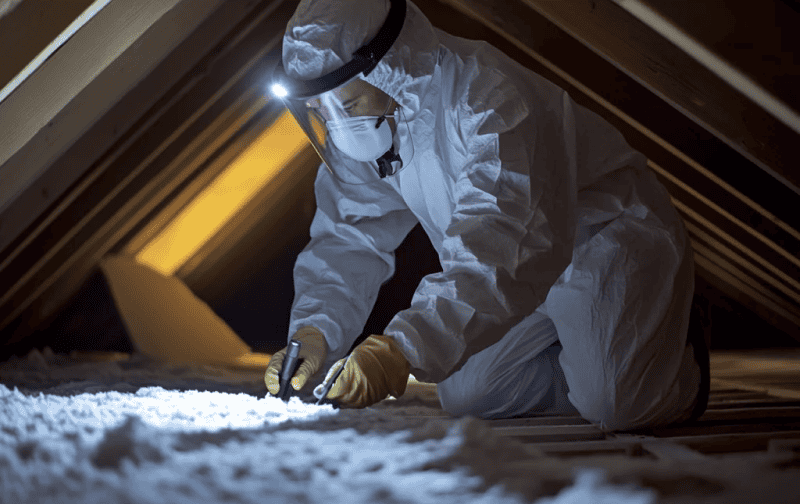
 Call us 877-451-9251
Call us 877-451-9251 Request Information
Request Information